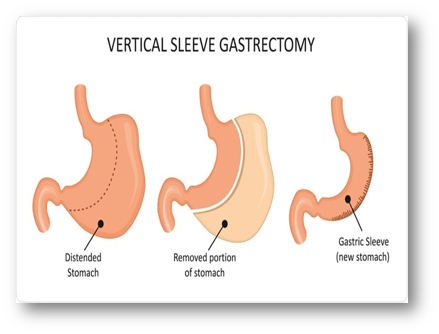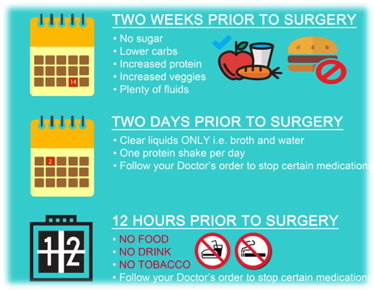What is Gastric Sleeve surgery?
Gastric Sleeve Surgery, often called as a “sleeve gastrectomy” is a bariatric surgery procedure whose primary function is to facilitate intake restriction by permanently reducing the volume of a patient’s stomach. Removing a major portion of the stomach leads to a significant reduction of ingastric volume, as well as reduction of the ghrelin hormone – which results in increased satiety and decreased appetite.
Gastric sleeve is an excellent choice for most bariatric candidates because it provides high levels of expected weight-loss and low surgical risks, in particular, because it is performed laparoscopically and is a minimally invasive surgery. It also provides easy dietary recommendations post-surgery, something enviable for other bariatric surgeries.
Overall, the gastric sleeve procedure is the ideal and the most successful procedure for many patients.

Are you a good candidate for Gastric Sleeve?
Not all overweight people qualify for the gastric sleeve. There are some criteria that must be fulfilled before a patient is approved for surgery. This can help to ensure that the procedure, recovery and lifestyle change will be a success.
The Gastric Sleeve weight loss procedure may be right for you if:
- You are between 18- 65 years
- You tried to lose weight with diet and exercises that have been unsuccessful
- Your body mass index (BMI) is 35 or higher
- Your BMI is 35 – 39.9 and you have a serious weight-related health problem, such as type 2 diabetes, high blood pressure, severe sleep apnea, high cholesterol etc.
- You’re a teenager who’s gone through puberty, your BMI is 35 or more, and you have serious obesity-related health problems, such as type 2 diabetes or severe sleep apnea

If one or more of the above applies to your lifestyle, you may be an ideal candidate for the gastric sleeve bariatric procedure. The only way to truly determine if you are eligible, though, is to have a consultation with one of the surgeons from our clinic.
Preparations and tests before Gastric Sleeve surgery:
Various methods are applied to determine the patient’s condition. First, the oral interview of the patient is done ( patients diet history, sports history, nutritional habits, problems and expectations). Then the stage of applying medical tests is started. The tests can be varied according to the condition of the patient, but some standard processes are followed in patients who are expected to undergo surgery including:
- Blood tests:
The eating habits of the patient cause various noticeable changes in the blood. With blood tests, the physical condition of the patient, the source of the problem, conditions that may interfere with surgery and the level of hormones can be determined. (blood sugar, ferritin, bilirubin, hemogram, iron, B12, folic acid, blood group, serological tests, APTT, ALT, AST, cholesterol, free T3, T4, TSH, trigliceride)
- Investigation of cardiovascular health:
It is known that cardiovascular health is not so good as a prediction in overweight patients. In order to confirm these predictions, other heart and vascular tests, especially ECG, are included. The main purpose is to determine whether the patient can withstand surgical intervention.
- Lung investigation:
Lung functions should also be evaluated in order to reduce the risks in the surgical process. If any disease or excess weight puts the lungs under pressure, functional loss may occur. These functional losses may also increase the risks in sleeve gastrectomy surgery, which is a very serious operation. In order to evaluate these risks and eliminate the disease, if necessary, tests on lung functions are applied.
- Examination of the liver:
The liver is a very important organ. Their contribution to the balance of hormone balance is quite large. It is also the storage area of starch. Determinations should be made before the operation regarding the presence of fatty liver. Since fatty liver can compromise the results of the operation, it must be determined before the operation.
- Investigation of gall bladder:
In order for the digestive system to work effectively, bile fluid must reach the intestines without any problem. In the presence of gallstones, problems can arise because the channels are blocked. The health condition of the gallbladder must be determined before the sleeve gastrectomy surgery that is interfered with the digestive system and if any, the stone must be broken.
- Investigation of digestive system:
Problems present in the esophagus, stomach and intestines are obstacles to sleeve gastrectomy surgery. Wounds, masses, ulcers, reflux or hernia prevent surgery. The internal area should be displayed as a standard application before the operation. This imaging is done by endoscopy.
- Other investigations:
Sleeve gastrectomy surgery is performed under general anesthesia. The patients’ responses to anesthesia should be measured before the operation. These tests are performed as a standard practice after the surgery decision is taken. In addition, the patient can be contacted with the psychiatry clinic depending on the situation. In this way, the psychological factors that cause eating disorders are identified and the patient is prepared for surgery.

Pre-Op Diet for Gastric Sleeve

Pre-op diet has many functions, including shrinking the liver, establishing a routine, and psychological benefits. It is designed to ensure a safe
surgical procedure. Also, the surgeon will have an easier time navigating your abdomen with a smaller liver.
Patients following the pre-op diet may have more surgical success and have an easier time with post-surgery weight loss. Your gastric sleeve pre-op diet will require you to:
- Reduce your calorie intake
- Eat more protein and vegetables
- Eat fewer carbs
- Drink more water
How Gastric Sleeve surgery works?
Gastric sleeve surgery works in two distinct ways, first is the reduction of the stomach’s capacity, also known as a restriction. This smaller stomach will make patients feel fuller faster after eating, signal your brain to stop eating.
Secondly, the ghrelin production will be reduced so this lowers the amount of eating desire also contributes to lower caloric intake, and thus, weight loss.
How it is performed?
Gastric Sleeve surgery is performed laparoscopically, under general anesthesia, with four 1 cm laparoscopic instruments inserted into the abdomen to allow the surgeon to enhance the maneuverability. Then the trocar is placed in the abdomen, whose purpose is to cut the stomach and staple the stomach closed.
During surgery, our surgeon will make four 1 cm incisions in your abdomen (which minimizes scars), insert various laparoscopic instruments, and remove about 80% of your stomach. This leaves a banana-sized “sleeve” that connects the esophagus to the small intestines. Your much smaller stomach will cause you to feel full sooner while eating so you’ll eat less and as a result, achieve long-term weight loss.
Gastric Sleeve surgery recovery
During your initial recovery, you won’t be able to eat or drink anything for 24 hours after surgery. Our surgeon will also get you up and walk around quickly to start the healing process after 6 hours.
Due to the minimally-invasive approach, the sleeve gastrectomy requires less recovery time than some similar, more intense procedures. Full recovery from gastric sleeve surgery will typically happen in few weeks.
We recommend that patients spend their time staying hydrated, resting as necessary, and avoiding any strenuous movements or exercises. Getting back to work depends on the physical requirements of your job, and most patients are back to their normal daily routine within two weeks.
Nutrition process after Gastric Sleeve surgery
The feeding process after surgery is very important. It is possible to divide the nutrition after surgery into three or four separate titles. Transparent liquid period, liquid period, pureed period and solid period.
In order for the long-term results of the operation to be successful and for the new stomach to adapt, special attention should be paid to the nutrition process. Our dietician, who takes care of you before and after the operation, will be included in the process and will plan the foods and consumption program prepared just for you.
What are the advantages of Gastric Sleeve surgery?
- With the method, the rate of weight loss is quite high after the sleeve gastrectomy surgery, in which the patient fully adapts and a good preparation process is skipped before the operation. In addition, the operation is quite comfortable as it is performed with closed technique.
- Since the stomach volume is restricted by up to eighty percent, the person’s consumption of food is not based on their own will, but on physical conditions. Even if you want to eat, the reduction of ghreline hormone will support you and you will be able to resist.
- The stomach volume being small enables the feeling of fullness to prolong for a very long time. Even at the end of the first year, almost all of the excess weight can be lost.
- Since the small intestine is not interfered in the operation, vitamin and mineral supplements are temporary. There is no lifetime use.
- The results of the operation are permanent if maximum attention is paid to those to be considered in the process after the operation. The moderate weight gain period does not occur.
- A non-foreign substance does not enter the body with the operation. The result is obtained by arranging completely organic structures such as prosthesis and stapler.
These are the general advantages of sleeve gastrectomy surgeries. Some other advantages are likely to emerge depending on people, their expectations and characteristics. When evaluated in general, it is possible to say that sleeve gastrectomy surgery is the most successful method to weight loss.
What are the results after operation?
Sleeve gastrectomy can provide long-term weight loss. The amount of weight you lose depends on your change in lifestyle habits. It is possible to lose approxi
mately 80 percent, or even more, of your excess weight within a year. In addition to weight loss, sleeve gastrectomy may improve or resolve conditions related to being overweight, including:
- Heart disease
- High blood pressure
- High cholesterol
- Obstructive sleep apnea
- Type 2 diabetes
- Stroke
- Infertility
Sleeve gastrectomy surgery can also improve your ability to perform routine daily activities more efficiently, and can enhance your life quality.
What are the possible risks and complications after the surgery?
Gastric sleeve surgery is considered a relatively safe procedure. However, like all surgeries, there can be risks and complications. Some complications can occur after almost any surgery. These include hemorrhage, deep vein thrombosis, pulmonary embolism, irregular heartbeat and pneumonia. Gastric sleeve surgery can have additional complications. Some possible side effects that are specific to this surgery include gastric leaks, stenosis, vitamin deficiencies and hearthburn.
It’s important to remember that changing your diet and exercise habits are essential for losing weight and keeping it off after gastric sleeve surgery.
It’s possible to gain the weight back if you:
- eat too much
- eat an unhealthy diet
- exercise too little
Average expected weight loss with Gastric Sleeve surgery
Most patients will wonder what kind of weight loss they can expect. There are several research studies suggesting the excess weight loss (EWL) of gastric sleeve surgery.
- 3 Month: Average of 33% Excess Weight Loss.
- 6 Month: Average of 50% Excess Weight Loss.
- 12 Month: Average of 70% Excess Weight Loss.
